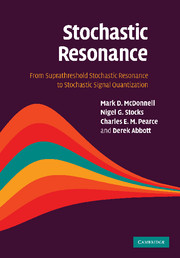Book contents
- Frontmatter
- Contents
- List of figures
- List of tables
- Preface
- Foreword
- Acknowledgments
- 1 Introduction and motivation
- 2 Stochastic resonance: its definition, history, and debates
- 3 Stochastic quantization
- 4 Suprathreshold stochastic resonance: encoding
- 5 Suprathreshold stochastic resonance: large N encoding
- 6 Suprathreshold stochastic resonance: decoding
- 7 Suprathreshold stochastic resonance: large N decoding
- 8 Optimal stochastic quantization
- 9 SSR, neural coding, and performance tradeoffs
- 10 Stochastic resonance in the auditory system
- 11 The future of stochastic resonance and suprathreshold stochastic resonance
- Appendix 1 Suprathreshold stochastic resonance
- Appendix 2 Large N suprathreshold stochastic resonance
- Appendix 3 Suprathreshold stochastic resonance decoding
- References
- List of abbreviations
- Index
- Biographies
Preface
Published online by Cambridge University Press: 23 October 2009
- Frontmatter
- Contents
- List of figures
- List of tables
- Preface
- Foreword
- Acknowledgments
- 1 Introduction and motivation
- 2 Stochastic resonance: its definition, history, and debates
- 3 Stochastic quantization
- 4 Suprathreshold stochastic resonance: encoding
- 5 Suprathreshold stochastic resonance: large N encoding
- 6 Suprathreshold stochastic resonance: decoding
- 7 Suprathreshold stochastic resonance: large N decoding
- 8 Optimal stochastic quantization
- 9 SSR, neural coding, and performance tradeoffs
- 10 Stochastic resonance in the auditory system
- 11 The future of stochastic resonance and suprathreshold stochastic resonance
- Appendix 1 Suprathreshold stochastic resonance
- Appendix 2 Large N suprathreshold stochastic resonance
- Appendix 3 Suprathreshold stochastic resonance decoding
- References
- List of abbreviations
- Index
- Biographies
Summary
Quantization of a signal or data source refers to the division or classification of that source into a discrete number of categories or states. It occurs, for example, when analogue electronic signals are converted into digital signals, or when data are binned into histograms. By definition, quantization is a lossy process, which compresses data into a more compact representation, so that the number of states in a quantizer's output is usually far fewer than the number of possible input values.
Most existing theory on the performance and design of quantization schemes specifies only deterministic rules governing how data are quantized. By contrast, stochastic quantization is a term intended to pertain to quantization where the rules governing the assignment of input values to output states are stochastic rather than deterministic. One form of stochastic quantization that has already been widely studied is a signal processing technique called dithering. However, the stochastic aspect of dithering is usually restricted so that it is equivalent to adding random noise to a signal prior to quantization. The term stochastic quantization is intended to be far more general, and applies to the situation where the rules of the quantization process are stochastic.
The inspiration for this study comes from a phenomenon known as stochastic resonance, which is said to occur when the presence of noise in a system provides a better performance than the absence of noise. Specifically, this book discusses a particular form of stochastic resonance – discovered by Stocks – known as suprathreshold stochastic resonance, and demonstrates how and why this effect is a form of stochastic quantization.
- Type
- Chapter
- Information
- Stochastic ResonanceFrom Suprathreshold Stochastic Resonance to Stochastic Signal Quantization, pp. xv - xviPublisher: Cambridge University PressPrint publication year: 2008



